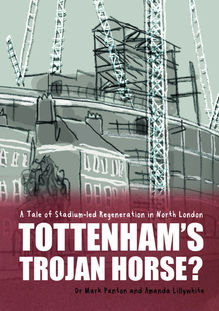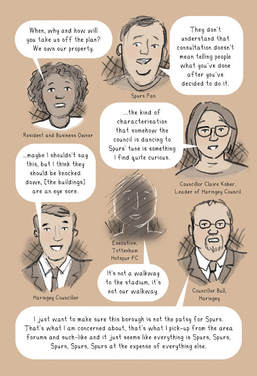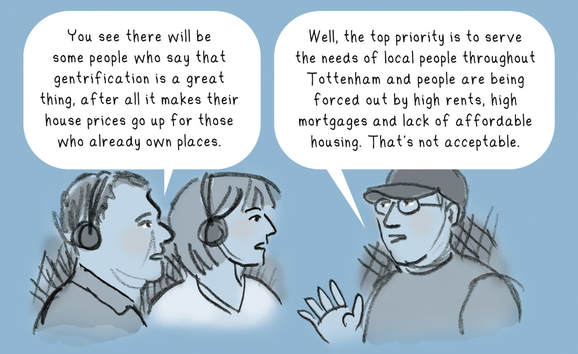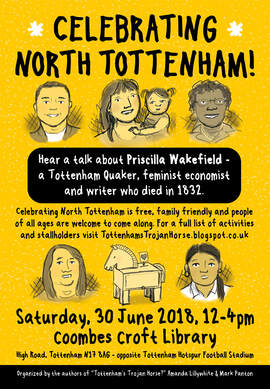Tottenham's Trojan Horse?
|
Tottenham's Trojan Horse? Dr Mark Panton researched the impact of football stadium-led regeneration projects for his PhD at Birkbeck and has now turned his thesis into a graphic book.
The book centres around a proposed fans' walkway from the site of a relocated White Hart Lane train station entrance to the new Tottenham Hotspur FC stadium and will require the demolition of homes. The page below shows a range of reactions to the proposals. All dialogue came from interviews with real people but unless they have been named their appearance has been altered to protect their identity. |
It should not be a case of redevelopment at any cost. It is completely unacceptable that the club comes here and offers nothing.You cannot pass this with no social housing, it is just wrong.
Cllr. Joseph Ejiofor, December 2015 However according to the Tottenham and Wood Green Independent of 17 December 2015 - plans for the new Tottenham Hotspur 61,000-seater stadium mean that:
Tottenham Hotspur were given planning permission for their new stadium after a council meeting on 16 December 2015. The Agenda of the meeting noted that the following points had been raised regarding the applications:
That out of 585 dwellings, there are zero per cent that are affordable, is an absolute scandal. This is part of a social cleansing plan directed at a poor community. Paul Burnham, Haringey Defend Council Housing |
Earlier changes reducing Spurs Section 106 contribution to Tottenham in 2012:
In a joint statement with Haringey Council in January 2012, Tottenham announced that it would stay in North Tottenham and work with the council to rejuvenate the area. The Section 106 agreement was revised by the Haringey Council in February 2012; the council waived the requirement for 50% affordable housing in the development,[ and the £16.436m investment in the community was reduced to £0.477m.
Northumberland Development Project wikipedia
In a joint statement with Haringey Council in January 2012, Tottenham announced that it would stay in North Tottenham and work with the council to rejuvenate the area. The Section 106 agreement was revised by the Haringey Council in February 2012; the council waived the requirement for 50% affordable housing in the development,[ and the £16.436m investment in the community was reduced to £0.477m.
Northumberland Development Project wikipedia
|
Sources:
Tottenham's Trojan Horse? A Tale of Stadium-led Regeneration in North London by Dr Mark Panton & Amanda Lillywhite, (Based on a case study in Mark Panton's doctoral thesis) Crazy Panda Publishing Funded by the Birkbeck School of Business, Economics and Informatics, University of London It’s just a Trojan horse for gentrification: austerity and stadium-led regeneration. Mark Panton and Geoff Walters, International Journal of Sport Policy and Politics, Vol 10, 2018 - Issue 1: Austerity This article presents case study research of the stadium-led regeneration project involving Tottenham Hotspur FC and the London Borough of Haringey, focusing on the community perceptions of urban regeneration. It has two aims: first, to understand the local authority’s approach to regeneration in the context of the austerity agenda, and second, to understand how this approach was perceived by, and the impact on, those communities living within the geographical locality of the developments. |
Saturday 30 June - Celebrating North Tottenham at Coombes Croft Library
Organised by the authors of Tottenham's Trojan Horse
Contact: [email protected]
|





